Using conversations
This article describes a using of conversations between ESL scripts.
We assume that there are the instances of two scripts of Server type E.A and E.B
(also opened picture can be a server script). These scripts run on two event
handlers A.EVH and B.EVH with the instance 0 (each running script is uniquely
addressable by a scheme
process;event;instance of event).
In order to handle the conversations, there are created the objects of ESL Interface type I.A and I.B, which implement the events E.A and E.B (usage of objects of ESL Interface type is not a condition).
The situation is illustrated on the figure below:
Configuration of interfaces:
; this procedure uses the existing conversation RPC PROCEDURE [_hTC, TC_C] ApplicationDefinedProcedure(IN INT _parameters) ; closing the conversation RPC PROCEDURE [_hTC, TC_E] SimpleAnswer(IN INT _parameters) ; closing the conversation RPC PROCEDURE [_hTC, TC_E] CloseConversation(IN INT _parameters)
ESL script, which implements I.A interface, should contain the implementation of ERROR procedure.
; called by an application server on transaction abort RPC PROCEDURE [_hTC, ERROR] OnConversationAborted
; procedure for creating the existing conversation (CALL TC_B) RPC PROCEDURE [_hTC, TC_B] CreateConversation(IN INT _parameters) ; one question (more answers) (CALL TC_BE) RPC PROCEDURE [_hTC, TC_BE] SimpleQuestion(IN INT _parameters) ; procedure for closing the conversation (CALL TC_E) RPC PROCEDURE [_hTC, TC_E] CloseConversation(IN INT _parameters) ; procedure that uses the existing conversation RPC PROCEDURE [_hTC, TC_C] ApplicationDefinedProcedure(IN INT _parameters)
ESL script which implements I.B interface, should contain the implementation of ERROR procedure.
; called by an application server on conversation abort RPC PROCEDURE [_hTC, ERROR] OnConversationAborted
Creating conversation (TC_B)
It is supposed that the conversation, which is created by calling CALL ... TC_B, will exist longer, or is necessary for changing more complex sequence of messages. The conversation is created the way that some script initiates it in relation to other script. In the example below, the conversation is initiated by E.A in relation to E.B:
CALL [E.B] I.B^CreateTransaction(IN ApplDefParam) ON B.EVH TC_B _hTC
_hTC is a declared variable of INT type. This action ensures creating the conversation, which will be identified by _hTC, and asynchronous sending of request for executing the RPC procedure I.B^CreateTransaction to E.B script. You should realize that if CALL action is executed successfully, the conversation will be created even though the addressed script E.EV;E.B;0 is, for some reason, inactive (impossible to execute the called procedure). This condition is considered to be a conversation error and the system ensures calling the procedure [_hTrans, ERROR] with appropriate _hTC.
RPC PROCEDURE [_hTC, ERROR] OnConversationAborted
In case of successful call of procedure I.B^CreateConversation, the conversation is considered to be created and both scripts are, in relation to it, equivalent and they may use it for changing the messages as asynchronous calling the RPC procedures.
The conversation is closed by calling the procedure of other entity (as both scripts are equivalent, it is not important which entity initiates the closing) by CALL action with a key word TC_E. In the example above, the action is called by E.A script. After calling the action, the identifier of conversation cannot be used for other calling of procedures (output is closed), but it can identify the conversation when processing the messages that may be still received (RPC PROCEDURE [_hTC]). The conversation will be completely closed after confirming this request from E.B script (E.B script calls CALL [_hTC] I.A^CloseTransaction(….) ASYNC T_E).
Changing the messages is described on the figure below:
Red lines represents the calls that manage the status of conversation.
The system automatically generates new status of conversation in the events such as:
- stop or crash of process (A.EVH or B.EVH),
- stop the script that participates on conversation (uloženie z CNF, GRE, ...),
- ...
The changes of status, generated by the system, are sent to the participant of conversation as the call of RPC PROCEDURE [_hTC, ERROR] ....
Creating and simultaneous closing conversation - Question (TC_BE)
Opening the conversation of TC_BE type is important if exchange of messages is in the format one question and one or more responses.
The first situation:
If some error occurs when delivering the question (calls of RPC procedure), E.A script is informed about it by calling RPC PROCEDURE [_hTC, ERROR].
The second situation:
Closing conversation (TC_E))
Each participating entity must close the conversation (if it was not closed by calling RPC PROCEDURE [_hTC, ERROR]).
Related pages:
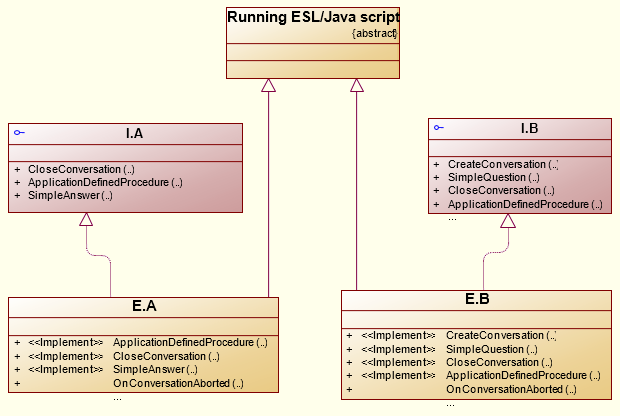
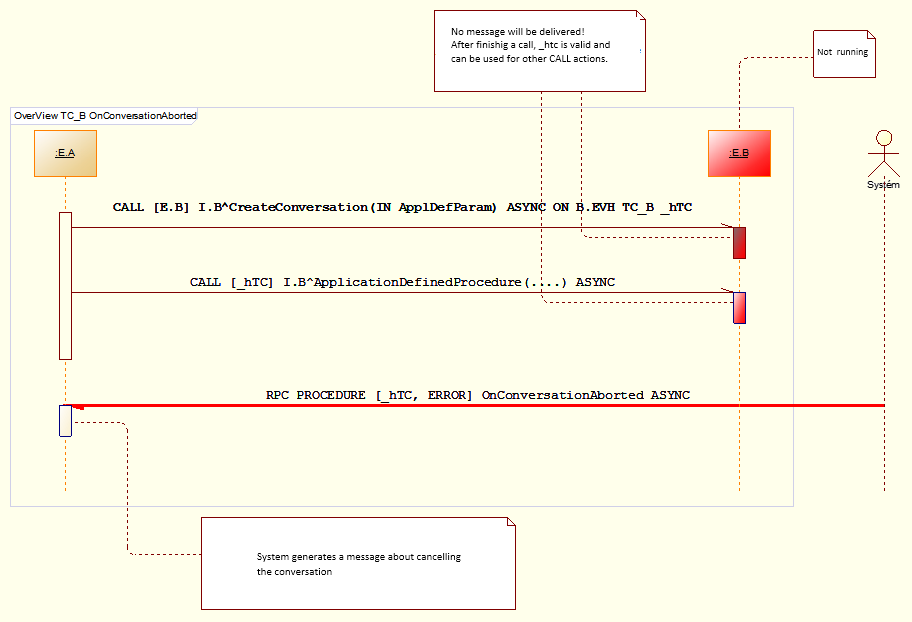
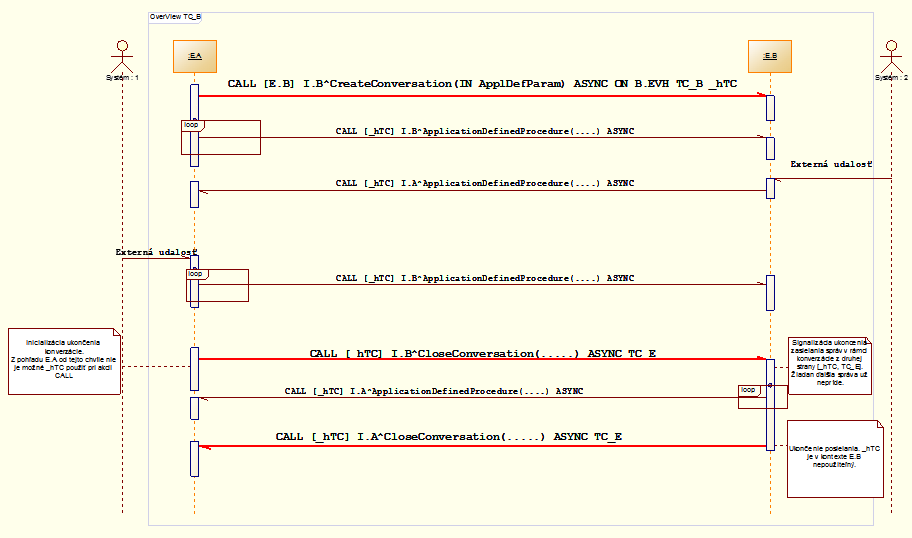
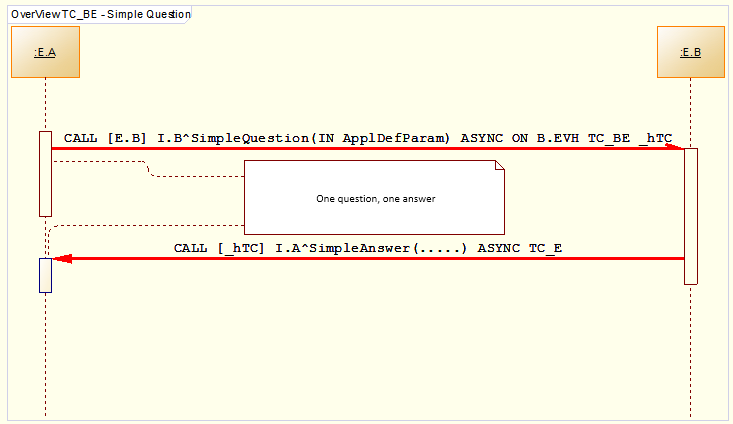
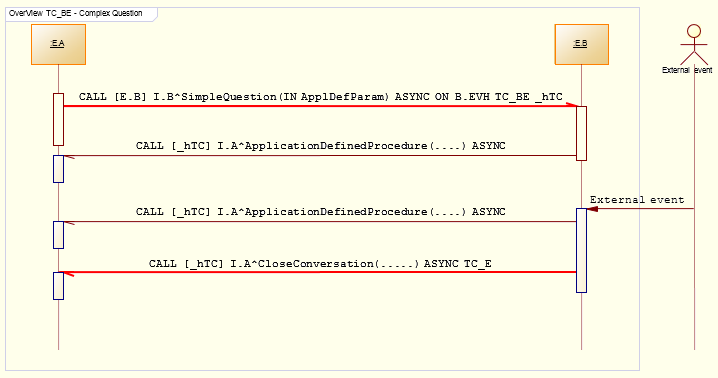
Pridať komentár